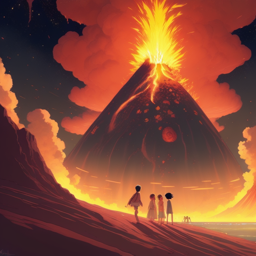
Fiery Fun: Earth’s Hot Cousin Throws Volcano Party!
Recommended for Middle Grades
Exciting news, young astronomers! Scientists have made an incredible discovery that could change our understanding of Earth-like planets. They have found a planet, not too far away at just 87 light years, that is almost the same size as our very own Earth. But hold on tight because this planet, known as LP 791-18d, is covered in raging volcanoes!
LP 791-18d orbits its star at a distance that is neither too hot nor too cold. It’s like a perfect balance, just right for the conditions needed for life. But here’s the catch: LP 791-18d is tidally locked.
In other words, one side of the planet always faces its star. Just like how one side of the Moon always faces the Earth. The side that’s always in the daylight is scorching hot, while the other side is in constant darkness.
Important Details
- Now, you might wonder how this planet with erupting volcanoes could be helpful to astronomers. Well, the discovery of LP 791-18d actually helps them understand how habitable conditions can emerge on Earth-like planets. The intense volcanic activity happening all over the planet could sustain an atmosphere. Also, that might allow water to condense on the cooler night side of the planet.
- The star that LP 791-18d orbits is called LP 791-18. It is much smaller and cooler than our Sun. Astronomers used a special telescope called the Spitzer Space Telescope to observe the star for a long time. They noticed slight dips in the star’s brightness called transits. This indicated the presence of another planet. They named this planet LP 791-18d.
- LP 791-18d is located much closer to its star than Earth is to the Sun. But because the star is cooler, the planet still sits in what’s called the habitable zone. This zone is where conditions may allow for liquid water to exist on the surface of a planet. So, despite the challenges, LP 791-18d could still be a potentially habitable world.
- The volcanic activity on LP 791-18d is caused by the planet’s orbit being affected by another planet in the system, a mini-Neptune named LP 791-18c. The planet LP 791-18d experiences heating from within as it gets closer to and moves away from its star, due to the stretching and compressing effects of changing gravity. This internal heating leads to the volcanic eruptions and may create a thick atmosphere.
- The researchers believe that studying LP 791-18d’s atmosphere could provide insights into the evolution of Earth and Venus. Both are volcanically active but have taken different paths. They also want to understand if tectonic or volcanic activity is necessary for life to exist on other planets.
- This discovery shows us how complex the conditions for habitability can be and reminds us to study each planetary system as a whole. It’s not just about finding Earth-sized planets in the right zone! We need to consider the influence of other planets in the system too.
- Excitingly, this is just the beginning! Scientists plan to use the powerful James Webb Space Telescope to further study LP 791-18d. And gather more information about its volcanic atmosphere. They hope to learn how the ingredients for life could come together on planets beyond our own.
- This groundbreaking research has been published in the prestigious journal Nature. Stay curious and keep exploring the wonders of our universe, young astronomers!
Similar Stories
Curious Times is a leading newspaper and website for kids. We publish daily global news aligned to your learning levels (also as per NEP 2020): Foundational, Preparatory (Primary), Middle and Senior. So, check out the News tab for this. We bring kids’ favourite Curious Times Weekly newspaper every weekend with top news, feature stories and kids’ contributions. Check out daily JokesPoke, Tongue Twisters, Word of the Day and Quote of the Day, kids need it all the time.
ME – My Expressions at Curious Times is your place to get your work published, building your quality digital footprint. And it is a good way to share your talent and skills with your friends, family, school, teachers and the world. Thus, as you will step into higher educational institutes your published content will showcase your strength.
Events, Quizzes and Competitions bring students from over 5,000 schools globally to participate in the 21st-Century themes. Here schools and students win certificates, prizes and recognition through these global events.
Sign-up for your school for FREE!
Communicate with us: WhatsApp, Instagram, Facebook, Youtube, Twitter, and LinkedIn.
0 (Please login to give a Curious Clap to your friend.)
